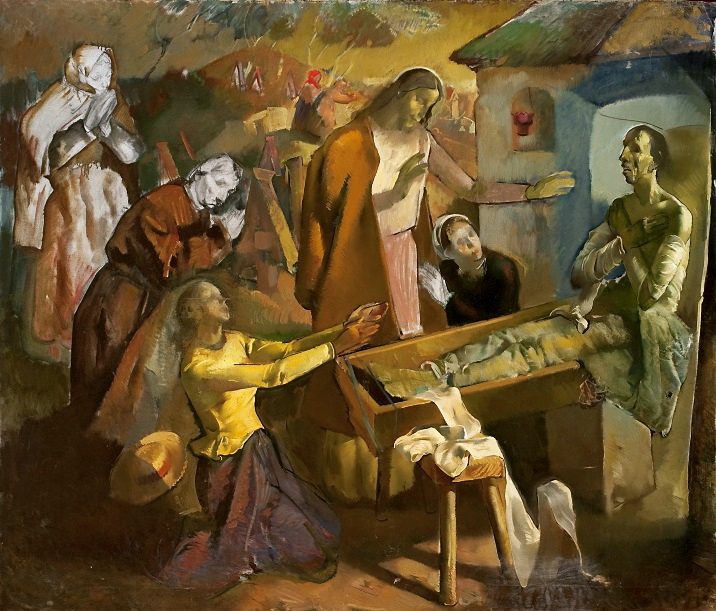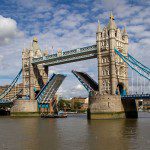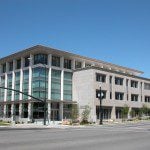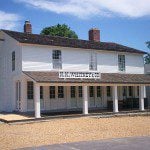
(Wikimedia Commons public domain image)
But, first, a new piece of mine appeared yesterday in Meridian Magazine: “Enduring Lessons from the Raising of Lazarus.” I hope that you’ll see some value in it.
***
I’m copying out, for my notes, passages that struck me while re-reading Eugene England, Brother Brigham (Salt Lake City: Bookcraft, 1980), some time back in preparation for the Interpreter Foundation’s planned Six Days in August film project. I see nothing wrong with sharing them here:
On 7 January 1847, the Council of the Twelve wrote from Winter Quarters, Nebraska, to some of its members who were over in England:
“Our President doesn’t stick [balk] at anything that tends to advance the gathering of Israel, or promote the cause of Zion in these last days; he sleeps with one eye open and one foot out of bed.”
But as had happened once before when he became this frenetic, harsh in discipline and tough in pushing his people, Brigham dreamed of Joseph giving him a kind of rebuke. In February Hosea Stout tells of Brigham relating to the high council that he saw Joseph Smith sitting in a room:
I took him by the hand and kissed him on both cheeks, and wanted to know, why we could not be together as we once was. He said that it was all right, that we should not be together yet. . . . Do you be sure and tell the brethren that it is all important for them to keep the spirit of the Lord. To keep the quiet spirit of Jesus. (132)
Please note Brigham’s devotion to Joseph Smith. It remained constant throughout Joseph’s life and to the very end of Brigham’s own. But back to the matter of Brigham’s occasional lapses into harsh rhetoric:
President Young knew well enough what his own chief fault was; in a speech in 1853 he told the Saints: “Never, in the days of my life, have I hurt a man with the palm of my hand. I never have hurt a person any other way except with this unruly member, my tongue.” (141)
On a very different theme, talking about the first, trail-blazing company of Mormon pioneers, which was almost entirely male:
William Clayton’s journal captures the unusual nature of this particular western migration:
[April] 24th. . . . Evening I walked over to Orson Pratt’s wagon, and through his telescope saw Jupiter’s four moons very distinctly never having seen them before.
[April] 30th. . . . Brother Hanson played some on his violin and some of the brethren danced to warm themselves.
[May] 18th. . . . At seven o’clock the President called the Captains of tens to his wagons and gave them a pretty severe lecture. He referred to some who had left meat on the ground and would not use it because it was not hind quarter. . . . God has given us a commandment that we should not waste meat, nor take life unless it is needful, but he can see a disposition in this camp to slaughter everything before them. (134-135)
And this is a nice passage, indicating not only the unique nature of the Latter-day Saint’s westward migration but a striking example of altruism directed — rather contrary to Richard Dawkins’s notion of the “selfish gene” — toward people with whom they rarely shared ties of genetic kinship:
But the Mormon Trail was unique not so much because it was efficiently, intelligently, and cooperatively made, but because it was a permanent two-way road. As Clayton’s and Bullock’s journals show, the pioneers constantly made new shortcuts, cut out dugways, removed stumps, constructed ferries and left crews to man them — improving the roads after they had passed — for those who would come later, people mainly unrelated to them by blood but ties even closer through the faith they shared and the holy covenants they had made with each other. (139)
I like this classic expression of Brigham Young’s belief in self-reliance and self-sufficiency:
When I cannot feed myself through the means God has placed in my power, it is then time enough for Him to exercise His providence in an unusual manner to administer to my wants. But while we can help ourselves, it is our duty to do so . . .
While we have a rich soil in this valley, and seed to put in the ground, we need not ask God to feed us, nor follow us round with a loaf of bread begging of us to eat it. He will not do it, neither would I, were I the Lord. (148-149)
It’s often observed that Brigham was a practical man. But it should never be forgotten that he was also a man of deep and confident faith:
After he was sustained as President of the Church, Brigham Young spoke, rather less formal when addressing his own people than in a letter to the world — but as expansive in vision:
I feel glory, Hallelujah! Nothing more has been done today that what I knew would be done when Joseph died. We have been driven from Nauvoo here, but the hand of the Lord is in it, visible as the sun shining this morning; it is visible to my natural eyes; it’s all right: and I expect when we see the result of all we pass through in this probationary state, we will discover the hand of the Lord in it all, and shout Amen — it’s all right! We shall make the upper courts ring. (143)
On 24 July 1852, Pioneer Day, “after a parade showing the progress that had been made in five years, President Young reviewed the peace they had found, after being persecuted and driven, reminding them that now they need fear only one thing — that a cessation of persecution would mean they had strayed from their religion and God:
I say to this community, be humble, be faithful to your God, true to His Church, benevolent to the strangers that may pass through our territory, and kind to all people; . . . but never fear the frowns of an enemy, nor be moved by the flatteries of friends or of enemies from the path of right. Serve your God; believe in Him and never be ashamed of Him, and sustain your character before Him, for very soon we will meet in a larger congregation than this, and have a celebration far superior; . . . we only celebrate now our deliverance from the good brick houses we have left, from our farms and lands, and from the graves of our fathers; we celebrate our perfect deliverance from these.
Our lives have been spared, and we are yet upon this planet; and by and by we will celebrate a perfect deliverance from all the powers of earth; and we will keep our eyes set upon the mark, and go forward to victory. (152)
***
Here is another worthwhile essay reacting to the recent CBS Sixty Minutes video-essay on the finances of the Church of Jesus Christ of Latter-day Saints: “The ‘Mormon’ Headline: Media’s Lucrative Obsession with Latter-day Saints: Delve into an intriguing journey from the historical ‘Mormon Question’ to the recent ’60 Minutes’ financial allegations. Uncover how media biases shape our perceptions of Latter-day Saints.”
Tad Walch, whose work for the Deseret News is always interesting and worthwhile, has recently written yet another interesting short piece. I found it just now in the Christopher Hitchens “How Religion Poisons Everything” File™: “What 7 Recent Latter-Day Saint Charity Projects, Small and Large, Reveal About the Church”
And here are some other materials from the Hitchens File™:
“Religion and spirituality play helpful role in mental health”
“Americans’ ‘Health May be Undermined’ by Not Going to Church: Surgeon General”
(To put these in context, an article in yesterday’s Wall Street Journal is helpful, if you can access it: “Young Americans Are Dying at Alarming Rates, Reversing Years of Progress: Car accidents, homicides, suicides and drug overdoses have pushed up death rates for children and teens in the U.S.”)













